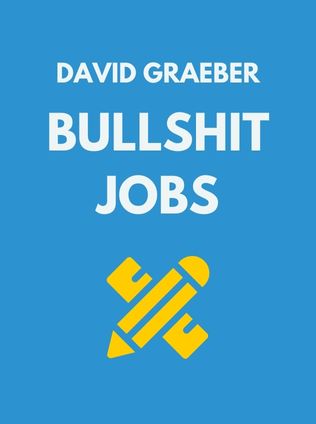
About the Author
David Graeber was a renowned anthropologist, activist, and influential thinker known for his contributions to economic and social theory. He was a professor at the London School of Economics and a leading figure in the anti-globalization and Occupy Wall Street movements. Graeber's work often explored the intersections of power, economics, and social structures, with a particular focus on the ways in which societal systems perpetuate inequality and injustice. His most famous works include Debt: The First 5,000 Years and The Utopia of Rules, both of which challenge conventional economic narratives and offer alternative ways of understanding the world.
Bullshit Jobs originated from a provocative article Graeber wrote for Strike! magazine, which resonated deeply with readers worldwide. The overwhelming response led him to expand his ideas into a full-length book, delving into the nature of meaningless work and its implications on modern society. Throughout his career, Graeber's sharp critiques of capitalism and bureaucracy have sparked both admiration and controversy, solidifying his legacy as a thinker who was unafraid to challenge the status quo.
Main Idea
In Bullshit Jobs, David Graeber argues that a significant number of jobs in modern industrial societies are, in essence, pointless. These "bullshit jobs," as he calls them, are roles that contribute nothing to society, and their existence raises fundamental questions about the nature of work, value, and purpose in contemporary life. Graeber posits that these jobs are not only unnecessary but also harmful, as they lead to widespread dissatisfaction and unhappiness among workers. He explores the economic, political, and cultural forces that have led to the proliferation of these jobs and suggests that our current system is deeply flawed. The book challenges readers to rethink the very nature of work and to consider the possibility of a world where meaningful, fulfilling employment is the norm rather than the exception.
Table of Contents
- What Is a Pointless Job?
- Why Are There So Many Pointless Jobs?
- Why Are Pointless Jobs a Problem?
- What Should We Do About Pointless Jobs?
What Is a Pointless Job?
Graeber begins his exploration of pointless jobs by defining them as roles that contribute nothing to society, and are often recognized as such by the very people who hold them. These are jobs where the tasks assigned are either not useful or, in some cases, actively detrimental to society. A key characteristic of these jobs is that the workers themselves often realize the pointlessness of their roles. Graeber's litmus test for identifying a pointless job is simple: if the person performing the job believes it to be pointless, it likely is.
This definition is inherently subjective, but Graeber argues that the individuals who perform these jobs are the most qualified to judge their value—or lack thereof. They are acutely aware of the impact, or lack thereof, that their work has on their organization and society at large. For instance, if an employee notices that their work has no effect on outcomes, whether they slack off or work harder, it is a clear sign that their role might be pointless.
Graeber goes further to question whether there are entire professions that could be deemed pointless. He suggests that we ask ourselves how society would change if a certain class of workers were to disappear overnight. For example, if truck drivers were to vanish, society would quickly feel the impact as goods would cease to be delivered. In contrast, if corporate lobbyists were to disappear, Graeber argues that the functioning of society might remain largely unaffected. This thought experiment invites readers to critically assess the value of various professions and consider the broader implications of maintaining jobs that do not contribute meaningfully to society.
Characteristics of Pointless Jobs
Through his research, Graeber identifies five key characteristics that are often present in pointless jobs:
Sign up for FREE and get access to 1,400+ books summaries.
You May Also Like
Rich Dad Poor Dad
What the Rich Teach Their Kids About Money - That the Poor and Middle Class Do Not!
By Robert T. KiyosakiFreakonomics
A Rogue Economist Explores the Hidden Side of Everything
By Steven D. Levitt and Stephen J. DubnerI Am Malala
The Story of the Girl Who Stood Up for Education and Was Shot by the Taliban
By Malala YousafzaiFactfulness
Ten Reasons We're Wrong About the World – and Why Things Are Better Than You Think
By Hans Rosling



















